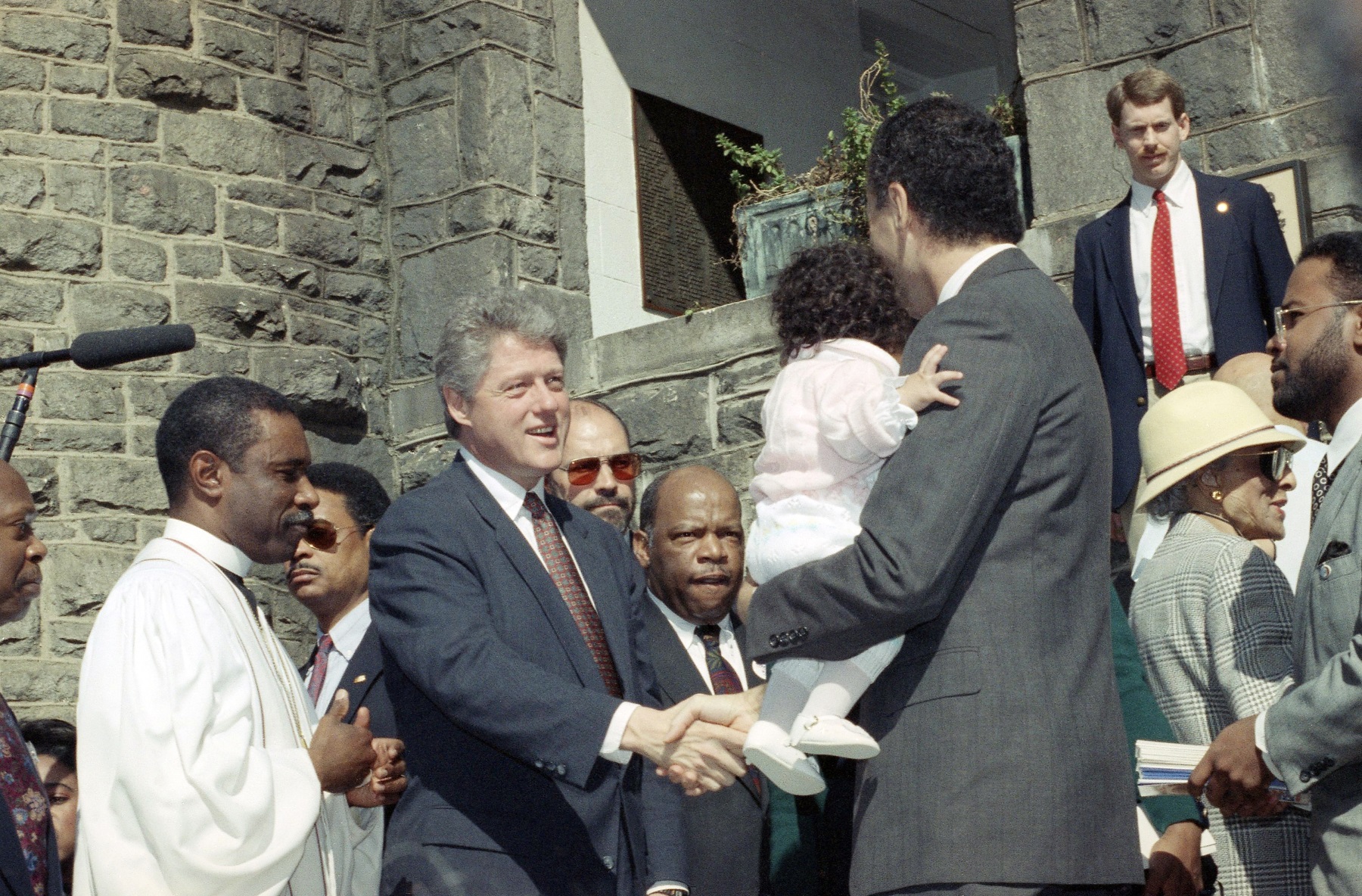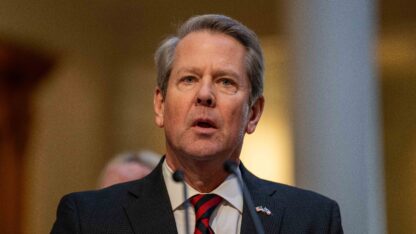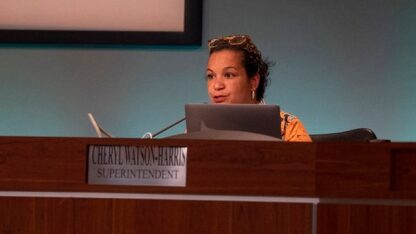‘Where’s The Beef?’ And Other Notable Moments From Past Democratic Debates In Atlanta

Then-presidential candidate Bill Clinton is flanked by the Rev. McKinley Young, left, and U.S. Rep. John Lewis, D-Georgia, as he greets parishioners at the Bethel A.M.E. Church in downtown Atlanta on March 1, 1992. Clinton and other Democrats were in Atlanta to participate in a debate.
Joe Holloway Jr. / Associated Press file
It was March 11, 1984, and five Democratic candidates, all of them men, sat on the stage of the Fox Theatre in a debate sponsored by the League of Women Voters.
Women were actually only specifically mentioned once that afternoon when one of the candidates, the Rev. Jesse Jackson, was asked about the so-called “misery index” felt by voters.
“Women are seeking to become empowered,” Jackson said. “Seventy percent of all poor children live in a house headed by a woman. Unless we empower women, then they will be more miserable.”
The “misery index” was a popular theme at the debate as it bolstered the Democrats’ argument that President Ronald Reagan’s fiscal policies only benefited the rich.
South Dakota U.S. Sen. George McGovern accused Reagan of spending too much on the military — a charge he also leveled at some of the plans of his fellow Democrats on the stage.
“What we’ve got is this same old argument: the Russians are coming, the Russians are about to jump on us,” McGovern exclaimed.
The Cold War made Russia a hot topic back then. Now it’s election interference involving the Russians.
Another common thread between now and then: trade policy.

“This is the worst trade year in American history,” former Vice President Walter Mondale said. “All through Georgia and Alabama and Florida farmers, industrialists … Alabama’s got 13.5% unemployment today. There’s a lot of people left behind. A lot of that is principally because of the trade disaster.”
But Mondale saved his sharpest attack of the day for the man sitting next to him on stage, Colorado U.S. Sen. Gary Hart.
Hart’s policies, Mondale quipped, were lacking in specifics.
“When I hear your new ideas,” Mondale said, “I’m reminded of that ad: ‘Where’s the beef’?’”
The crowd roared with laughter.
It was a moment that has lived on in debate history.
Mondale, would go on to win the Democratic nomination, but lost the election to Ronald Reagan.
Clinton At Center Of 1992 Debate
Eight years later, in 1992, the Democrats came to Atlanta again, this time trying to unseat Reagan’s successor, George H.W. Bush.
At the center of the stage that day at the Carter Center — founded by former President Jimmy Carter — was the 45-year-old governor of Arkansas, Bill Clinton.
“Let me begin by saying I’m honored to be here in the Carter Center,” Clinton said. “I hope he appreciates this debate today as I think he must.”
The debate that ensued focused mainly on health care. And it sounded not too different from what we hear today, as witnessed by the platforms of then-Nebraska U.S. Sen. Bob Kerrey and Jerry Brown, who was in between stints as governor of California.
“Every single American will have a card; they’ll be allowed to choose their doctor; they’ll be allowed to choose their hospital,” Kerrey said.
“We’re all part of a universal system, then the needs of all people will be served,” Brown argued.
Clinton said coverage wouldn’t matter much to rural Americans if they had no doctors close by.
“In my plan, we would allocate some money for rural health clinics and to working partnerships like the ones you have here in Georgia, probably the most successful of its kind in the country,” Clinton said. “With Mercer, with the Medical College of Georgia, with the state and local officials here.”
Twenty-seven years later, Mercer continues filling the void in smaller Georgia communities where health care providers struggle to survive.
And of the four candidates on stage at the Carter Center that day in 1992, it was only the late Massachusetts Congressman Paul Tsongas who acknowledged the reality of paying for it all.
“Giving it to everybody is the easy part, how you contain the cost is the difficult part,” said Tsongas.
Two days later, Clinton won the Georgia primary.
In November of that year, he captured the state’s 13 electoral votes en route to a victory over George H.W. Bush.
This week’s debate in Atlanta won’t determine the 2020 nominee, but it will be one of the last times the candidates share a stage before voting begins in Iowa on Feb. 3.








